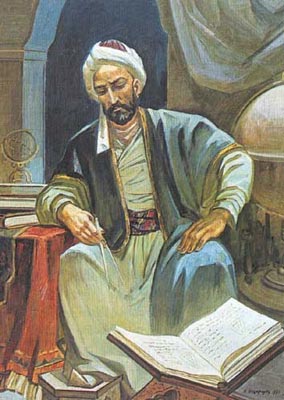 Nasraddin Tusi (1201-1274) was one of those remarkable medieval Muslim all-round scholars who took education to remarkable heights while feudal Europe was still in dark-age elementary school. He found 38 ways to prove Pythagoras's Theory, developed trigonometry as a separate discipline and found methods for solving cubic equations. Incredibly, many of his treatises on mathematics and morals were written while a prisoner in the infamous Assassins Castle at Alamut (Persia).
Nasraddin Tusi (1201-1274) was one of those remarkable medieval Muslim all-round scholars who took education to remarkable heights while feudal Europe was still in dark-age elementary school. He found 38 ways to prove Pythagoras's Theory, developed trigonometry as a separate discipline and found methods for solving cubic equations. Incredibly, many of his treatises on mathematics and morals were written while a prisoner in the infamous Assassins Castle at Alamut (Persia).
On his release (in 1256) he found time to create the greatest astronomical telescope of the day (at Marageh in south Azerbaijan - now Iran), make fundamental advances in the mathematics of spherical geometry and write such boffin-baffling books as Counting Totality, The Measure of Poems and Perpetuity and infinity in the Cosmos. The branch of Tusi's family which settled in Ordubad occupied a succession of senior positions in the 16th-century court of Shah Ismail Qatai and his Persian sucessors including Shah Abbas who reportedly exempted the family from all taxes. A carved stone originally incorporated into the facade of Ordubad's main mosque, confirmed the fact.
Azerbaijan's astronomical pedigree
Extraordinary new ideas have been known as 'revolutionary' ever since the Polish astronomer Copernicus published his theory of 'planetary revolution' in 1543. Copernicus' idea of a spherical, spinning world was revolutionary in political as well as physical terms. But new it was not some 300 years earlier, astronomer Nasruddin Tusi and his Azeri students had taken for granted that the world was round and had accurately calculated its diameter.
Tusi's great 1261 observatory and his 400,000-volume library at Maraga (now Maraqeh, Iran) were sadly destroyed by Timur a century later. Nonetheless, Tusi remains a posthumous Azeri national hero. This is quite in line with historical precedence. Court astronomers were the most respected scientists in a khan's mediaeval palace. If you visit Baku's Shirvanshah Palace, note that the most visible turbe marks not a prince's tomb but the grave of the royal astronomer. Azerbaijani Islam's animist undercurrents add to the obvious universal appeal of space and the stars as a subject for local writers, eg
Full of enigmas the sky opens like a book
Infinite and boundless invites us to look
Deep and still deeper into wide unfathomable depths
Of mysteries profound
(Roughly translated from 'Astronomer and Poet' by Bakhtiyar Vagabzade who also wrote a ditty called 'The Observatory')
If you're planning a trip to Azerbaijan you may be interested ▶ Azerbaijan highlights - For those who prefer to go unbeaten path, to explore less visited places and check national charisma of this small country in Southern Caucasus on the edge of Europe.



